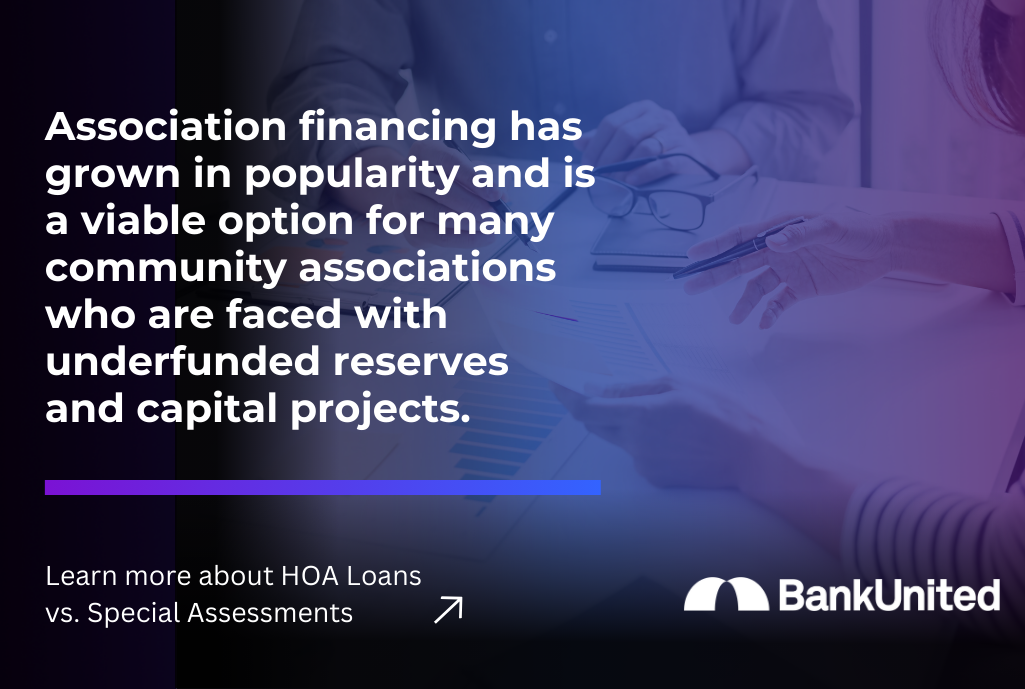
Associations can find themselves in a situation where reserve funds are not adequate to cover the cost of upcoming capital projects. This can be due to many reasons; including underfunding of reserves or increase to construction and labor costs compared to the original estimate for the planned projects. Having regular updates to your reserve study can help manage funding for future capital projects.
What do Associations do when they find their capital reserve at a deficit? The dreaded phrase, "special assessment," starts to circulate throughout the community. However, there are options for the HOA and its members. Options to consider include a one-time special assessment, HOA loan or a combination of both. There are pros and cons to each.
Pros and Cons of Special Assessments
The first option is a one-time special assessment to the residents. The cost per resident is typically based on the percentage of interest in the common elements as described in the governing documents ensuring a fair distribution of costs. An assessment is typically a fixed amount determined by the Board and may be voted on by the membership. This is usually payable within a specific timeframe. If a portion of the assessment is not paid by the resident, it could be considered delinquent. Depending on the complexity of the project, the assessment may be a sizable amount which could result in a hardship for many of the residents that do not have cash readily available. Multiple special assessments may also have a negative impact on the community for homeowners who may be fearful of what is next.
There are some benefits to the special assessment as well. The Association will raise full project cost directly from the residents in order to avoid completing the project in stages. This approach will eliminate added interest cost which is associated with an HOA loan.
Benefits of Association Financing
Association financing has grown in popularity and is a viable option for many community associations who are faced with underfunded reserves and capital projects. Associations are able to use the balance sheet of the community to determine their credit quality and borrowing capacity. Borrowing funds does not affect personal credit and alleviates the difficulty for some residents that don’t have cash on hand to pay a one-time special assessment. When financing projects, the debt payback can be spread over a longer period called amortization. For example, if an Association needs to fund a roof replacement, they can spread the cost of the project over a 10-year period to make the debt service payback more reasonable for its members. This provides the residents with an opportunity to plan their finances and budget for regular monthly debt service payments. The cash is immediately available after the loan has closed, which helps with the negotiation of the contract pricing because like the special assessment, the project doesn’t need to be phased.
A loan provides flexibility of repayment options and terms. Borrowers can choose the loan amount and repayment period that best suits their financial situation. The interest rate can vary depending on the credit quality and market conditions. Additionally, loans typically have covenants agreed to by the financial institution that need to be met on an annual basis including certain insurance coverages and annual financial requirements depending on the loan size.
Conclusion
What is the right answer? There is no right answer on how to fund capital projects when there aren’t ample reserves available. Each option has advantages and disadvantages that need to be discussed with the membership to determine what is the best fit for every community. Providing transparent communication to the members will ensure everyone has clear expectations of the purpose, proposed costs and timeline. This helps foster trust and cooperation among residents and ensures a smooth implementation of either the special assessment or loan option.
Bring in your professionals early to help with the due diligence stage of planning. Your engineer, banker, accountant, and attorney can add valuable input which can help ease the burden of executing on these projects. Both options can be important sources of funding depending on the association’s financial needs and goals and help to preserve property values. A well-maintained and funded community is more attractive to potential buyers and can lead to higher resale values.
Originally published in Washington Metropolitan Chapter Community Associations Institute’s Quorum Magazine, August 2024


